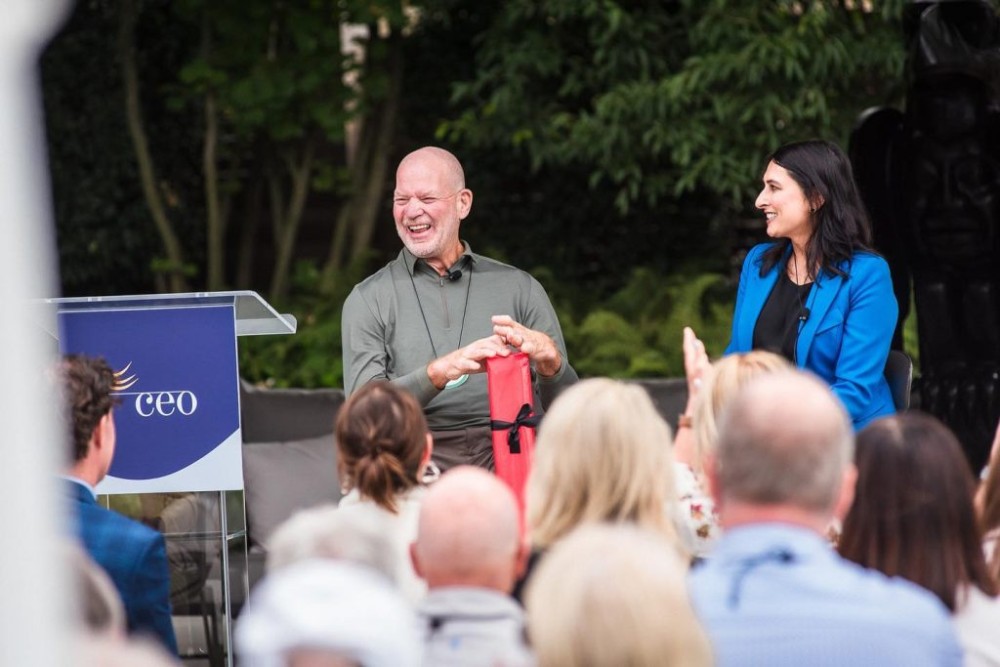Joshua Butler, the founder of J.Butler Golf, speaks to David Ho about the importance of inclusivity over exclusivity in fashion

Chip Wilson, the founder of Lululemon, recently made waves with some controversial comments on his former company’s efforts to create sportswear for a diversity of body types. “They’re trying to become like the Gap, everything to everybody,” said Wilson, who added that companies have “got to be clear that you don’t want certain customers coming in.”
He further blasted the activewear company’s current models as “unhealthy,” “sickly” and “not inspirational” as he called out Lululemon’s “whole diversity and inclusion thing.”
This isn’t the first time Wilson has been in hot water. He had stepped down as chairman in 2013 after stating that Lululemon’s leggings “don’t work for some women’s bodies” and that shunning plus sized clothing was a key strategy for the company. Previously, he had also shared that he chose the Lululemon name because he thought it would be “funny” to hear Japanese consumers struggle to say a brand name with three L’s in it as the sound does not exist in Japanese phonetics.

But not everyone wants to eschew inclusivity in favour of exclusivity. Joshua Butler, founder of J. Butler Golf, has come in defence for more diversity, equity and inclusion (DEI) efforts in the fashion industry.
Butler, a former student-athlete and c-suite executive with experience in healthcare and higher education, set up his activewear brand with a mission to provide accessible apparel and equipment for those in golf. J. Butler Golf’s range of luxury golf wear come in sizes S to 2XL and are in accessible price points.
Butler shares his reaction to Wilson’s statements and gives #legend his brutally honest takes on increasing DEI in the luxury fashion sector.
What would be your response to Wilson’s statements, especially about companies not needing to cater to every demographic?
Sometimes people forget where their success comes from. It’s easy for Chip to make these types of comments now that he’s made money off of people from diverse backgrounds who built Lululemon to what it is today. However, with Chip’s perspective, it’s not surprising that his Lululemon legacy includes a company rife with lawsuits for DEI issues, a predominantly homogenous executive leadership team, and a brand that loves to market to – and profit from – the advancement of people from diverse backgrounds whom they would never want in their executive offices.
Chip only likes diversity when those individuals work for him. He reflects the shady and negative side of having substantial wealth. Aware enough, to strategize and take advantage of diverse demographics to accumulate his wealth, but too egotistically arrogant to remember where it comes from.
It’s also shocking that Chip would make such inflammatory comments about people being too “sickly” to wear the clothes, when the founder of Lululemon lives with a subtype of muscular dystrophy and benefits off the publicity and tax advantages of his philanthropy towards research.
Also see: Gab Waller on fashion trends for 2024
Luxury brands in particular, have long thrived on the concept of exclusivity. What would diversity and inclusion look like in their case?
Generally speaking, luxury brands have long thrived off the labor of those who build their companies but cannot generally afford to buy their goods. Exclusivity is nothing more than allowing the wealthiest populations to convince the less affluent that luxury cannot be within reach unless ‘you work as hard as you possibly can’ in those companies to help everyone at the top make as much money as they can before you’re allowed inclusion at discounted prices and salaries.
To be inclusive is to break the mold of rules that were set to ensure certain populations of people never gained access to the same resources hoarded at the top. No wonder exclusive companies don’t want to be inclusive, because it threatens the wealth and power dynamics of how they make their money on the people they exclude.
This is why diversity and inclusion is important because it breaks the rules of having to accept that only a select few should have access to the best.

Some say diversity and inclusivity has become a cynical box ticking exercise for corporations. In your view, how can companies (especially luxury brands) expand and keep it authentic?
There’s no cookie cutter approach to answering this question. However, you can look at the most senior level positions of a company and generally gain a pretty good perspective about the culture of the organization. If all of your executives are culturally homogenous, but they’ve hired a black person as the Chief Diversity, Equity, and Inclusion Officer, it is a general indicator that they don’t take DEI seriously. They just need a figure-head to check the box for media relations.
Then take a look at the racial and talent demographics of people facilitating the administrative work in a company. If your company is more diverse at the bottom than it is at the very top, then the company is simply using DEI as a new form of corporate slavery to make profits from those who can’t change the rules. Hiring someone to do a job that has a dead-end track to middle-management is not advancing their access to opportunities, it’s advancing the company’s agenda for profiteering.

For the luxury market, what are the main challenges you see in promoting diversity and inclusion there?
The main challenge in the luxury market is greed. Consumer marketing has done a phenomenal job convincing consumers that only rich people deserve to have nice things because they worked hard to achieve it. That’s not always the case. From a political perspective, it’s why less affluent people will often vote against their own interest for the promise of capitalism that never places more food on their table, but continue to experience lower discretionary income as a result of being brainwashed to pay for corporate greed.
CEOs and corporate executives in the luxury market make millions in annual salaries and bonuses while their junior level employees struggle to pay for basic daily necessities. Companies argue over minimum wages to pay the absolute least, but never argue over charging consumers US$100 (HK$782) and US$200 for leggings because people still aspire to feel more luxurious despite their economic situations.
Waste, inefficiency, and excessive marketing costs are the greatest threat to consumerism, because these luxury companies must convince consumers to pay higher costs for different logos on the same products to ensure shareholders and investors receive their annual dividends.
Black and brown people in the United States are the most powerful consumers, yet they are often marginalized to paying more for less quality items, or being required to do more to achieve higher socioeconomic status. The promotion of diversity and inclusion doesn’t take something away from someone else, but it does require those who have attained things easily to have to compete more fairly with those who now have access to the same resources. This is why the luxury market needs to change, because luxury should be within reach for everyone, but it would require those who can already afford it to have to work to keep it.

What would you suggest to overcome the aforementioned issues?
The older population needs to retire and move on. The issue for most of the world is that diverse populations of young people with fresh, new perspectives are being locked out of opportunities. The older executives and leadership teams not only entrench themselves to power, but they also stagnate external growth by only promoting and hiring the same kinds of people that look and live like them. The reason company cultures never permanently change, is because the same people who originally ruined the cultures are still in place. Worse, is that companies will hire outdated senior executives that leave one company’s culture in shambles just because the person’s resume says they helped their previous company make profits. The ‘how you do it’ is as important as the ‘why you’re doing it’ in corporate leadership.
What would greater inclusivity mean for the luxury consumers?
Access to experiences they should have already been able to enjoy.
Also see: Year of the Dragon fashion accessories






